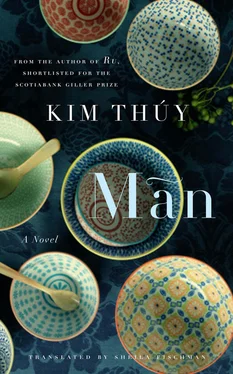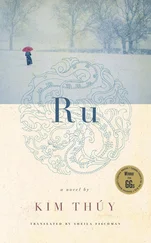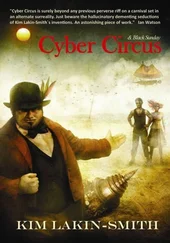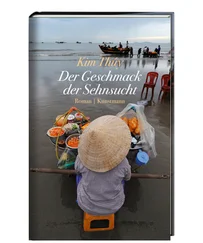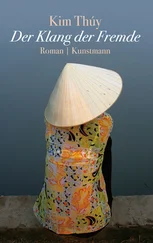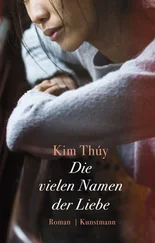Mẹ Ghẻ

cold mother
HER FATHER WOULD HAVE preferred not to have children with a second wife after the sudden death of the first, for that new spouse would inevitably become a Mẹ Ghẻ —a “cold mother.” However, he did not yet have a son who would ensure the continuity of his own father’s family name and that of all the ancestors who watched over him and carried him from the top of their altar. And so that cold mother played her role as spouse by giving him sons, and the role of parent in the manner of the stepmothers of Snow White, Cinderella and all the other orphaned princesses.
It should be said that ghẻ also means “mange.” And so, to live up to the ugly title “mangy mother” that had been inflicted on her, she showed her children how to hate Maman and her big sisters, how to draw the line between the first and second litter, how to differentiate oneself from those other girls even though they all had the same nose. I wonder if that mangy mother would have been less bitter had she been called stepmother . Would she have been less afraid of the beauty of Maman’s big sisters? Would she have been less eager to marry them off?
sạn

gravel
BEING YOUNGER, Maman awaited her turn to be given in marriage separating the stone and gravel fragments from the rice like prayer beads. Her cold mother forbade the cooks to help her so she would learn obedience and discipline. And so what she learned above all was how to become flexible, imperceptible, invisible even. When her mother died, people told her that she’d gone because she had finished paying her debts on earth. So then Maman discarded stones as if they were part of her debt, a weight that prevented her from taking flight. She got rid of them in the hope of arriving at the state of weightlessness. She was thrilled to see her jar fill up with those impurities meal after meal, day after day. She buried the jar under the mango tree next to the cookie tin that held Une vie , by Guy de Maupassant, a book from her mother’s library that she’d been able to save. Her cold mother needed space on the shelf for the wind to circulate around the hammock. She may have been right, because the length of cloth that hung from the ceiling functioned as a fan, moving the air just above her husband’s sleeping body.
quạt

fan
IT WAS UP TO MAMAN to pull the cord that made the fan move from left to right at a steady rhythm so as to drive away the heat without interrupting her father’s siesta. Maman loved that special moment with him; she was certain that the gentle, repetitive movement reassured him, confirmed that family harmony existed.
Sometimes, when he was so preoccupied he couldn’t sleep, he would ask her to recite Truyện Kiều , the story of a girl who sacrificed herself to save her family. Some say that as long as the poem, with its more than three thousand lines, still exists, no war can make Vietnam disappear. Maybe that is why, for more than a century, even an illiterate Vietnamese has been able to recite entire stanzas.
Maman’s father demanded that all his children learn the poem by heart, because in it the poet depicted, among other things, purity and selflessness, two shades essential to the Vietnamese soul. As for Maman’s mother, she always came back to the first lines of the poem, which remind the reader that everything can change, everything can topple in the blink of an eye.
One hundred years, span of a human life,
A combat zone where fate and talent clash, ruthless
The ocean roars where brambles once grew
In this world the spectacle clutches your heart.
Why be surprised? Nothing is given without compensation.
The blue sky often rains its curses on beauties with pink cheeks.
nhân dạng

identity
MAMAN SAW HER LIFE turned upside down when the first shot was heard in an ambush between two shores, between East and West, between the resistance clamouring for independence and the current regime that taught Vietnamese students to say “our ancestors the Gauls” without seeing any inconsistency. She was on one of the Mekong ferry boats when the first bullets struck passengers. Everyone fell and took cover instinctively. And instinctively, she raised her head during the first silence as preparations were being made for the second burst of fire. Her neighbour, an elderly man with missing teeth, leathery skin and bright eyes, looked down as he ordered her to throw all her papers overboard: “If you want to survive, get rid of your identity.”
hai làng đạn

two lines of fire
AFTERWARDS, CHAOS. Children sobbing as they begged their parents to wake up, hens clucking and struggling in their wicker baskets, objects falling then landing and gliding from left to right and right to left became entangled to create the cacophonous melody typical of panic in the face of the unknown and, even more, the known. The conflicts lay in the cracks of normality. They breathed the same air as the girls skipping rope and they shared the spaces of the boys who were playing at cricket fights. People learned to give money to government officials by day and rice to the partisans by night. They crept between two lines of fire, careful not to set foot on one boundary or the other, invisible and changing depending on the time. They remained neutral by embracing both, like a father who loves his two warring sons.
Maman, without identity papers, could go on being neutral when armed men told her to get up and follow them. She took only three steps before fainting because she had seen her white tunic coloured with blood-red stains. She thought she’d been hit, but it was the blood of other passengers, including the neighbour who had been impassive in the face of orders given at the butts of rifles and the barrels of guns.
kiên nhẫn

patience
MAMAN WOKE UP IN the corner of a straw hut, surrounded by familiar sounds. Nearby, crackling coals, the rustling of water palms and the whispering of discussions were punctuated by the yapping of dogs and the steady whack of a knife on a plank of wood. The scent of chopped lemongrass caressed her nostrils like a mother’s hand on her cheek. In this way, she stopped being afraid. Still, she opened her eyes on a world that was strange and unknown to her. In the village, there were no longer “women” or “men,” no “aunts” or “great-uncles,” only comrades. She became Comrade Nhẫn, a name she gave herself before opening her eyes for the first time, a name that had no baggage and no family. The name came to her almost naturally because she’d repeated it hundreds of times over basins of her brothers’ and sisters’ soiled laundry. At each of the spots and dirty marks they’d made deliberately to spoil the whiteness of the white cotton and to challenge the effectiveness of 72 percent soap like that from Marseille, she said very softly, “ kiên nhẫn ”—“patience”—her personal mantra, or rather her personal accomplishment, because she was finally able to hear the gently captivating melody created by the rubbing of wet and soapy cloth.
For five years she lived in this village as Nhẫn, a name that carried a message, like all the others. Some had chosen Determination ( Chí ). Others had preferred Fatherland ( Quốc ), and still others had dared to pick Courage ( Dũng ) or Peace ( Bình ). All had given up Orchid ( Lan ), Prosperity ( Lộc ) and Snow ( Tuyết ).
Читать дальше
